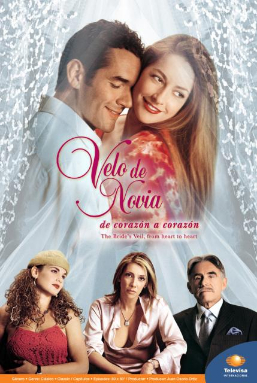
El derecho de nacer is a Mexican telenovela produced by Ernesto Alonso for Televisa in 1981. Based on the Cuban radionovela of the same name written by Félix B. Caignet adapted for TV by Fernanda Villeli and directed by Raúl Araiza.
Mi pequeña Soledad is a Mexican telenovela produced by Verónica Castro for Televisa in 1990.

Teresa de Jesús Buenfil López, commonly known as Erika Buenfil, is a Mexican actress, TV host and singer. She is best known for her lead roles in several successful telenovelas including Amor en Silencio (1988), Marisol (1996), Tres Mujeres (1999–2000) and Amores Verdaderos (2012–2013). Since September 2019, Buenfil runs a YouTube channel named as 'Sazonando con la Buenfil'.

The LVI Legislature of the Congress of Mexico met from 1994 to 1997.

Amor en silencio is a Mexican telenovela produced by Carla Estrada for Televisa in 1988. Its first broadcast was in Mexico in 1988 and then made its debut in Latin America, Europe, Asia and, in a unique situation, it was broadcast in the United States by Telemundo during primetime. It can be said that this is the only Televisa telenovela that was never shown on Univision. Back then Telemundo got the rights to Amor en silencio and Pasión y poder, the latter one got picked up by Univision in 1993 as daytime programming.

Muchachitas como tú is a teen Mexican telenovela produced by Emilio Larrosa for Televisa in 2007. It is an adaption of the Mexican telenovela Muchachitas, also produced by Emilio Larrosa. It premiered on April 23, 2007 and ended on November 9, 2007.

Duelo de Pasiones is a Mexican telenovela produced by Juan Osorio for Televisa. The telenovela based on radionovela Flor del Campo. It premiered on April 17, 2006 and ended on October 27, 2006.

Amor sin Maquillaje is a mini novela that was shown in 2007. It is a production of Rosy Ocampo, who also produced La Fea Mas Bella. It stars Marlene Favela, Sergio Goyri, Lucía Méndez and Carmen Montejo. It was a tribute to the 50 years of telenovelas in Mexico.

Mañana es Para Siempre is a Mexican telenovela produced by Nicandro Díaz González for Televisa in 2008. It is an adaption of the 2007 Colombian telenovela Pura sangre. It aired on Canal de las Estrellas from October 20, 2008 to June 12, 2009.

Velo de novia is a Mexican telenovela produced by Juan Osorio for Televisa in 2003. It aired on Canal de las Estrellas from June 30, 2003 to January 2, 2004. The telenovela stars Susana González, Eduardo Santamarina, Héctor Suárez, Cynthia Klitbo, Blanca Guerra and Carmen Salinas.
La antorcha encendida is a Mexican telenovela produced by Ernesto Alonso and Carlos Sotomayor for Televisa in 1996. It was the last historical telenovela produced by Televisa. The plot tells the Independence of Mexico, with an emphasis on historical accuracy. It was written by Fausto Zeron Medina in collaboration with Liliana Abud. It premiered on Canal de las Estrellas on May 6, 1996 and ended on November 15, 1996.
Mi segunda madre is a Mexican telenovela produced by Juan Osorio for Televisa and broadcast by Canal de las Estrellas in 1989. It starred María Sorté, Enrique Novi and Daniela Castro as protagonists, with Fernando Ciangherotti and Alejandra Maldonado and Cynthia Klitbo as antagonists.

La casa en la playa(The House on the Beach) is a Mexican telenovela produced in 2000. Cynthia Klitbo and Sergio Goyri star as the protagonists, while Blanca Guerra and José Carlos Ruiz star as the antagonists.
Angélica is a Mexican telenovela produced by Ernesto Alonso for Televisa in 1985. It is an original story by Marissa Garrido and directed by Sergio Jiménez.
El engaño is a Mexican telenovela produced by Ernesto Alonso for Televisa in 1986. It is an original story by Caridad Bravo Adams, adapted by Fernanda Villeli and directed by Sergio Jiménez.
Carrusel de las Américas is a Mexican Children's telenovela produced by Valentín Pimstein for Televisa in 1992. It is both a sequel and remake of 1989 telenovela Carrusel. Chain member of the memorial project Americas 500 years since the discovery of America. It was shown via satellite to Latin America as part of that program block.
Prisionera de amor is a Mexican telenovela produced by Pedro Damián for Televisa in 1994.
María José is a Mexican telenovela produced by Juan Osorio for Televisa in 1995.
Salud, dinero y amor is a Mexican telenovela produced by Emilio Larrosa for Televisa in 1997–1998. Is a sequel of 1995 Mexican telenovela El premio mayor.

Así son ellas is a Mexican telenovela produced by Raúl Araiza for Televisa in 2002.











